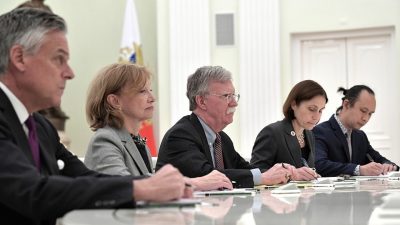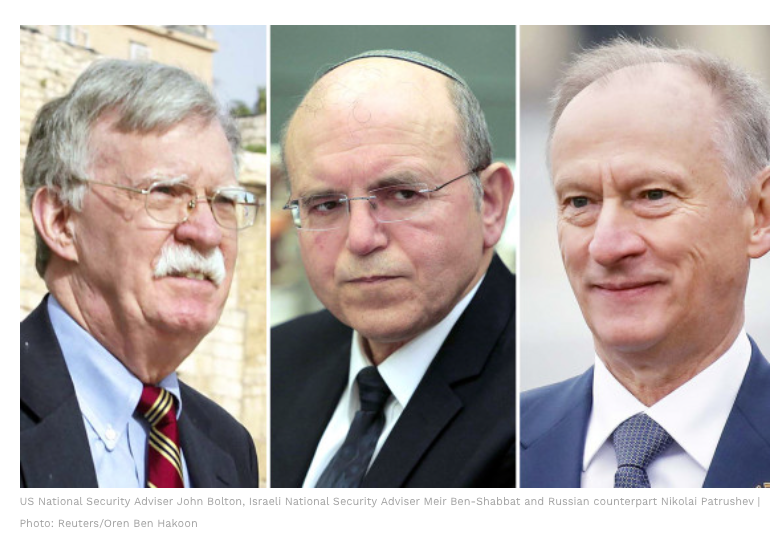Secret US-Russia-Israel National Security Summit in Jerusalem: What is the Hidden Agenda?

This week’s National Security Advisor summit in Jerusalem is an historic event because of the participation of the Russian, Israeli, and American representatives during this multi-day meeting from 24-26 June, but it’s also a juicy one too because of the many rumors that it’s given rise to, the most popular being the possibility of a so-called “grand deal” being clinched about the future of the Middle East.
US National Security Adviser John Bolton together with his Israeli and Russian counterparts Meir Ben-Shabbat and Nikolai Patrushev will meet behind closed doors in what is described as an “unprecedented summit” in Jerusalem.
According to the Israeli media: “The chaos in Syria, rising tensions in the Persian Gulf” are on the agenda.
President Putin answered a question in this respect during last week’s hours-long Q&A session, mocking the terminology of a “grand deal” for sounding like “some commercial act” and then reaffirming that his country “doesn’t sell out our allies, our interests or our principles”. Nevertheless, if the concept of a “grand deal” doesn’t include “selling out” the aforementioned, then Russia might very well go along with it, which could prospectively be the purpose of this unprecedented meeting.
Israeli Prime Minister Netanyahu has spent the past month taunting Iran by declaring that this get-together will be focused on its regional activities, especially its military presence in Syria, which was corroborated by unnamed American officials who confirmed as much to the press. The Russians have been tight-lipped about the topics that would be discussed but their representatives assured the public that they’ll take Iran’s legitimate interests into account, hence Putin’s response about how Russia won’t “sell out our allies, our interests or our principles’. Even so, Russia has been practicing a delicate “balancing” act for the past couple of years whereby it’s “passively facilitated” hundreds of Israeli strikes in Syria against suspected IRGC and Hezbollah targets while still retaining its on-the-ground anti-terrorist military alliance with Iran, but it seems like the time has finally come for it to more decisively lean one way or the other.
Russia’s 21st-century grand strategy is to become the supreme “balancing” force in Afro-Eurasia, to which end it’s struck up a slew of non-traditional partnerships such as the very close ones that it presently enjoys with Israel and its not-so-secret Saudi ally, both of whom are opposed to the expansion of Iran’s regional influence. With this in mind, the Jerusalem Summit might end up being an attempt to calibrate the Russian, Israeli, and American positions on this issue and — according to unconfirmed reports — see the latter two offer Moscow some vague incentives such as possible sanctions relief to encourage Iran’s “phased withdrawal” from Syria. Seeing as how the last two days of the meeting coincide with the Bahrain economic conference that’s supposed to form the apolitical component of the US’ “Deal of the Century”, any progress on the Syrian-Iranian front would probably be inextricably connected to this new regional vision.
About that, Russia has publicly insisted that the only acceptable solution to the Palestinian issue is the creation of two separate states along the pre-1967 borders, and even though it’s unlikely that Moscow will compromise on this principle of international law, it might show more flexibility on other facets. For instance, the “Deal of the Century” doesn’t seem to be exclusive to the Israelis and Palestinians, but appears to be a euphemism for the entirely new regional order that’s arisen out of the aftermath of the so-called “Arab Spring” theater-wide Color Revolutions, therefore making the National Security Advisor summit somewhat akin to the first part of a modern-day but much more secretive Yalta Conference for shaping the post-Sykes-Picot Mideast. Considering the likelihood that this is the case, then the meeting is much more important than the media’s initially let on, though that doesn’t necessarily ensure its success.
It’ll remain to be seen what, if anything, is agreed upon by the three National Security Advisors, but the very fact that they’re spending three days in a city as symbolic as Jerusalem to discuss regional issues (first and foremost among them Iran and everything related to it) in this very specific and high-tense context says a lot about the intent of these ultra-busy individuals to clinch some sort of unofficial agreement at the very least. Whatever might be decided upon will obviously concern Iran, but at this point the outcome can only be speculated upon and might not even be known until months after the meeting ends if the informal understanding reached between the participants is kept secret for sensitivity’s sake. In any case, Russia won’t “sell out” its allies, interests, or principles, but will do whatever it can to advance its national security objectives via its regional “balancing” strategy.
*
Note to readers: please click the share buttons above or below. Forward this article to your email lists. Crosspost on your blog site, internet forums. etc.
Andrew Korybko is an American Moscow-based political analyst specializing in the relationship between the US strategy in Afro-Eurasia, China’s One Belt One Road global vision of New Silk Road connectivity, and Hybrid Warfare. He is a frequent contributor to Global Research.
Featured image is from kremlin.ru



